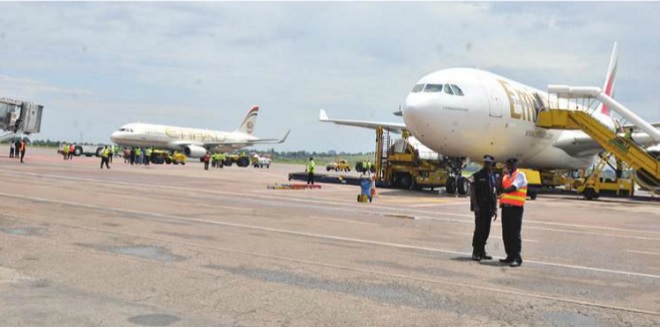
Aviation bodies in the East African region are considering shifting the airport control systems to a cheaper, more efficient, and safer satellite navigation system.
The satellite-based system will be supported by the European Geostationary Navigation Overlay Service (Egos).
In the recent meeting held in Kigali, Rwanda the East African Community and the Inter Governmental Authority on Development agreed that the new technology be embraced by Dec 2018.
“It is an evolution like any normal wireless connection, where you can send or receive accurate data at a very low cost,” the director of Egnos Africa Ladislaus Matindi said.
He said the new technology has helped European countries increase the efficiency and safety of air transport, and cut costs of navigating planes by over $500 million a year.
Currently, the ground-based navigation system is used to manually support airplanes in landing, departure and surface operations across the region.
****
Air transport sector at climate juncture
After years of delays and failures, the airline industry began on Wednesday complex negotiations to implement a scheme to reduce its carbon footprint.
Although the aviation sector was exempted from the December 2015 Paris accord on reducing greenhouse gas emissions linked to global warming, aviation officials are mindful of the need to curb the sector’s growing CO2 emissions.
Climate change topped the agenda at the opening of the International Civil Aviation Organization (ICAO)’s triennial meeting on Tuesday.
“The global aviation network currently manages some 10 million passengers and 100,000 flights daily, with international aviation contributing 1.3 percent a year to global man-made CO2 emissions,” ICAO president Olumuyiwa Benard Aliu said.
ICAO delegates are expected to adopt by consensus a climate scheme called the Carbon Offset and Reduction Scheme for International Aviation, or CORSIA.
Its goal is to cap airline CO2 emissions by 2035 at 2020 levels.
Although climate activists have panned the initiative, the aviation sector says the target is ambitious — and a real challenge, considering that the number of flights and passengers are expected to double during that period.
To meet the target, CORSIA would be implemented in two phases, starting with a voluntary phase and then making it mandatory in 2027.
So far, 59 countries have agreed to participate in the first phase, including all European countries, the United States, China, Canada, Australia and Japan.
These nations account for 80 percent of worldwide air traffic, making them the source of a lion’s share of the industry’s greenhouse gas emissions.
They are pressing others at the meeting, which wraps up on October 7, to support CORSIA as well.
‘No plan B’
One of CORSIA’S strongest proponents is the European Union, whose own efforts to curb emissions by jetliners using its airspace have failed.
“We are at an historic juncture,” said EU Transport Commissioner Violeta Bulc.
“Let us not dwell on the mistakes of the past, but build on the momentum of COP21 and focus on the road ahead,” she urged.
The aviation industry must first agree to adopt an existing set of international standards for measuring emissions, which would allow airlines to buy credits from companies in other sectors at market rates.
“We are strongly behind this process,” said Paul Steele, a director of the International Air Transport Association (IATA).
Airlines are expected to spend no more than US$25 billion to buy emissions credits in 2035, which is only about one percent of projected total revenues, he noted.
All nations except the least developed countries, small island states and countries with a small volume of international air travel (less than 0.5 percent), would join the second phase under the proposed scheme.
CORSIA has opponents, however. Russia and India objected to its adoption on the eve of the ICAP meeting.
India’s minister of civil aviation, Gajapathi Ashok, said: “We do not agree on a freezing of emission at 2020 levels.”
“This would be regressive and hurt the aviation sector… especially for countries where aviation sector is not mature,” he added.
Russian Deputy Transport Minister Valery Okulov also was critical, saying it “will not reduce the volume of greenhouse gases, but rather increase it.”
CORSIA, he predicted, will “negatively influence the development of civil aviation.”
Steele, however, said delegates don’t have much choice but to adopt CORSIA. There is “no plan B,” he said.
Additional reporting AFP
****
editor@independent.co.ug
 The Independent Uganda: You get the Truth we Pay the Price
The Independent Uganda: You get the Truth we Pay the Price



